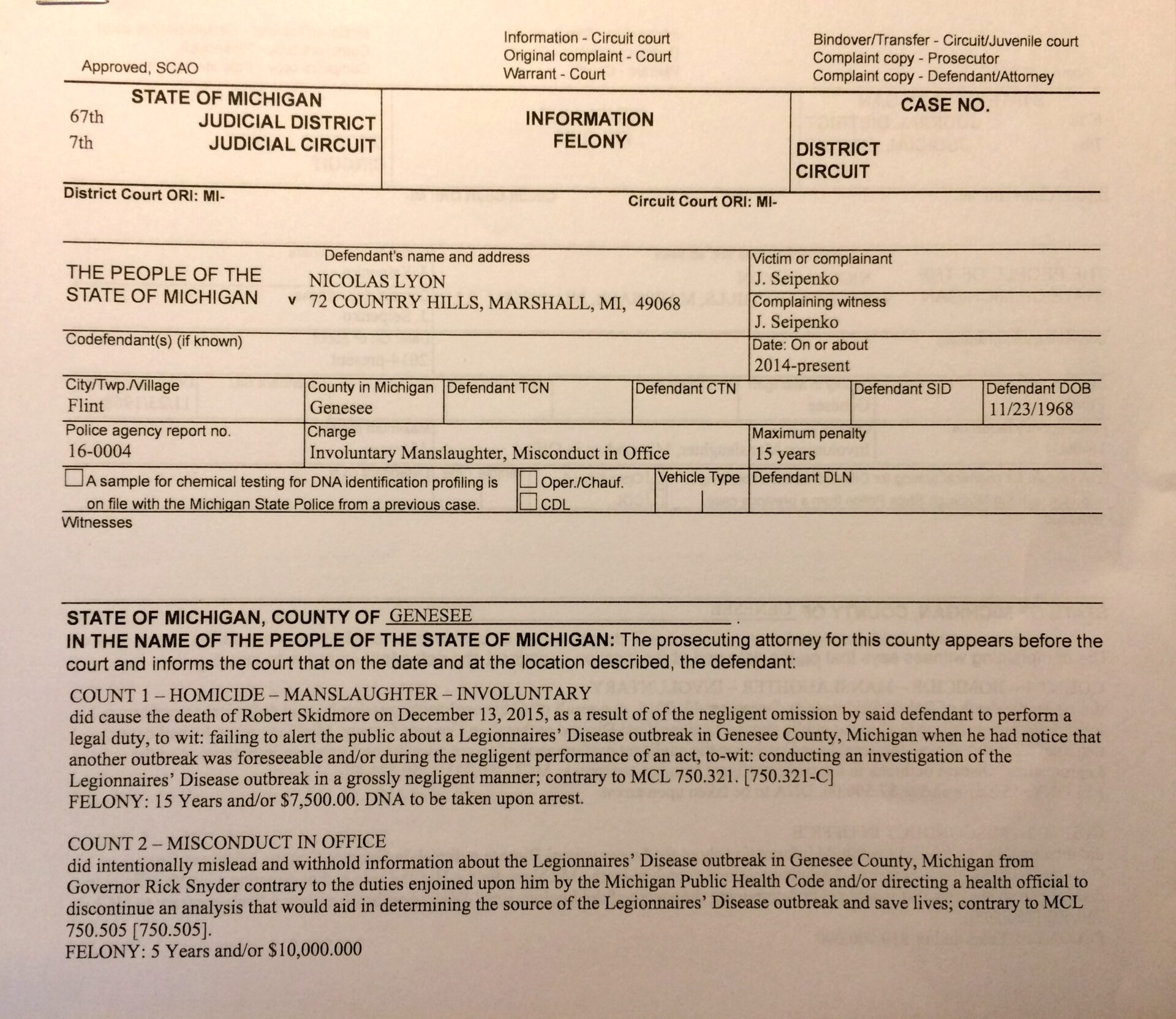By Jan Worth-Nelson
Charges of involuntary manslaughter related to the Flint water crisis have been slapped on five past or present state officials for their alleged “failure to act,” leading to deaths from the Legionnaires Disease outbreak of 2015.
Highest ranking among the indicted was the state’s Director of the Michigan Department of Health and Human Services, Nick Lyon, charged along with four other principals in the crisis, at a packed press conference in downtown Flint today.
The involuntary manslaughter charges, brought by State Attorney General Bill Schuette, were linked to the death of just one of the victims of the Legionnaires Disease outbreak that swept through Flint in the summer of 2015: Robert Skidmore, a GM-Fisher Body retiree, father, grandfather and great-grandfather. Skidmore died after 15 days with Legionnaire’s in December, 2015.
Others charged with involuntary manslaughter were former Flint emergency manager Darnell Earley, former City of Flint Water Department Manager Howard Croft; Michigan Department of Environmental Quality’s Drinking Water Chief Liane Shekter-Smith and MDEQ Water Supervisor Stephen Busch.
In addition, a sixth official, Eden Wells, chief medical executive of the Michigan Department of Health and Human Services, was indicted on charges of obstruction of justice, a felony; and lying to a peace officer, labeled a “high court” misdemeanor. The indictment alleges that during the course of the investigation, she “attempted to withhold funding for the Flint Area Community Health and Environment Partnership if the partnership did not cease its investigation” into the source of the Legionnaires outbreak.
The indictment indicated nvoluntary manslaughter is punishable by up to 15 years in prison and/or a $7,500 fine.
Of the six named today, four already had been indicted on other charges: Croft, Earley, Shekter-Smith and Busch. Today’s actions were the first against Lyon and Wells.
Noting that many families in Flint still drink, cook and bathe in bottled water, Schuette said “The health crisis in Flint has created a ‘trust crisis’ in Michigan government, exposing a serious lack of confidence in leaders who accept responsibility and solve problems.”
Today’s charges bring to 51 the total of indictments, involving 15 current or former state officials. Schuette characterized the process as “the most comprehensive investigation in the modern history of Michigan” and said the team had interviewed more than 250 and pored through hundreds of emails and documents.
The outbreak of Legionnaire’s which led to the deaths of 12 and struck dozens of others, has been correlated with use of improperly treated Flint River water in 2014 and 2015. When the city went back onto Detroit water, incidences of the disease tailed off.

Michigan Attorney General Bill Schuette flanked by (from left) Todd Flood, David Leyton and Andy Arena.(Photo by Jan Worth-Nelson)
Once again, a familiar quartet of investigators who have worked on the case for two years appeared before the media and lights in a meeting room at the Riverfront Center in downtown Flint: Schuette; former FBI agent Andy Arena; Genesee County Prosecutor David Leyton: and former Wayne County Prosecutor Todd Flood each made statements about the latest charges.
The team issued an interim report saying that they are shifting to the trial and prosecution phase, suggesting to some that further indictments might not be expected; but Schuette said investigations would continue as the prosecution phase proceeds.
“As we shift to the trial phase, we will turn to the prosecution of those who have been charged. We are very confident the charges we have filed will hold up in court,” Schuette said.

Local freelance writer Scott Atkinson covering for the New York Times.(Photo by Jan Worth-Nelson)
Anticipating a likely question from the roomful of reporters, Schuette said, “Many people are asking, why aren’t you charging Gov. Snyder? I have met with people who are angry and frustrated, demanding that I charge him. But we only file criminal charges when evidence of probable cause of committing a crime have been established,” he said. “This process been about one system of justice,” he added. “Accountability and responsibility are the cornerstones of our mission, based on whether crimes have been committed — we all owe that to the citizens of Flint.”
“I don’t take this lightly,” Schuette said. “This investigation is about the people of Flint, and nobody else. It is time to refocus the lens on the families of Flint that are still suffering as the result of government failure.”
“This is about trust — and restoring accountability and trust to the people of Flint,” he said.

Weaver surrounded by reporters after the announcement.(Photo by Jan Worth-Nelson)
Mayor Karen Weaver, who defeated Dayne Walling in an election based intensely on the water crisis, was swamped by a scrum of reporters after the press conference. Asked if the manslaughter charge will finally be big enough to impress upon the city that things are happening, she said, “Well I hope so, these are serious charges. I hope this lets people know that this has been taken very seriously, and it’s not over.”
Asked by a Michigan Radio reporter, “Is this the beginning of justice?” Weaver replied, “I hope so, I hope so.”
Tim Monahan of Flint, one of the victims of Legionaires Disease in 2015 who survived, still isn’t convinced the indictments mean justice for him and the others.
Interviewed at his home near Atwood Stadium, Monahan said he still can only work three to four hours a day, is behind on all his bills, needs a new roof, and still is getting water bills for $130 a month for water he cannot drink. He said he believes the investigation still is highly politicized by Schuette’s gubernatorial ambitions.

Monahan being interviewed by NBC News freelancer Katy Berg at his home after the indictments (Photo by Jan Worth-Nelson)
However, Monahan said the one piece of interesting news was the connection made in the indictments between Flint River water and Legionnaires Disease. He said that was the first time he had heard officials admit the water crisis and the Legionnaires outbreak were connected.
Asked what he wanted to say to his fellow Flint residents in the aftermath of the indictments, Monahan said, “Keep fighting.”
EVM editor Jan Worth-Nelson can be reached at janworth1118@gmail.com.








You must be logged in to post a comment.